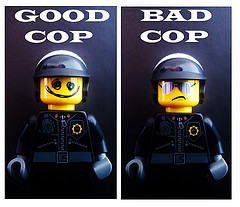
Photo Credit: eric_maniac via Compfight cc
You know the drill. Before a business negotiation you and your partner decide which one will be the good cop and which one will be the bad cop. Some have it down to a science…and then there is me.
I have a tough time being a bad cop – something about being a people-pleaser and watching too much Andy Griffith Show growing up.
I relate to Alan Arkin as the precinct captain in “So I Married an Axe Murderer” who struggles to find his tough cop voice.
Many of us remember the infamous line from our childhood, “Just wait until your father gets home!” Cliche, but pretty accurate. Dad was the enforcer and mom was more of the compassionate cop you could go to after the fireworks (or the belt strap).
I do not want to suggest healthy parenting requires parents to be good cops and bad cops on some rotating basis to keep the rugrats obedient.
As single-fathers we know it’s way more nuanced. You and your kids are in this position because something tough happened. You may all be in counseling trying to deal with the pain, guilt, sorrow, anger and trauma. Talking about emotions and feelings has become more comfortable, or at least something you’re working on.
You and I are both enforcer and refuge. Disciplinarian and comforter.
I have figured out it’s pretty much impossible to play both roles, so I have had to refine my view of how to approach discipline. Volumes of leather-bound books have been written on every side of the “how to” discipline, but we need to examine the bigger picture first.
Here is what I am learning about disciplining without a spouse:
1 – What you say goes. Your kid doesn’t have anyone else to turn to (maybe even manipulate) when it comes to rules and discipline. Remember the power and finality of your words before you speak them. They can easily build up and teach or tear down and drive away.
2 – Establish clear boundaries, rules, consequences, and expectations. I have lots of room to improve in this area – mainly on the consequence side of things. The consequences I impose on my son for the same action have varied based on the kind of day I had. Not a good strategy. This point deserves more discussion in a future post, but in the meantime I recommend “Boundaries With Kids” by Dr. Henry Cloud – an excellent resource.
[NOTE] This February I had the privilege of hearing John Cotton Richmond speak at Donald Miller’s Storyline Conference. He gave an excellent presentation on parenting and the rules in the Richmond household. Keep your eyes open for him and any speaking he does in your community – very inspiring and full of wisdom.
3 – Clear communication maintains the relationship. If we are clear with our kids, set boundaries, and demonstrate love consistently, they will instinctively know we love them even when we have to correct them. Parent after parent confirm this through their life experiences: children want the safety and security of rules and boundaries. My son does not love the correction, but he understands I love him unconditionally so the sting isn’t so bad. I don’t have to turn around and take him out for ice cream after taking away a privilege so he knows I still love him.
I want my son to know I discipline him because I love him and set boundaries with consequences because I want the best for him. That’s the bottom line.
Let’s leave the good cop/bad cop shtick to screenwriters.
What lessons have you learned about disciplining your kids? Leave a comment below.
This post originally appeared in August, 2014
